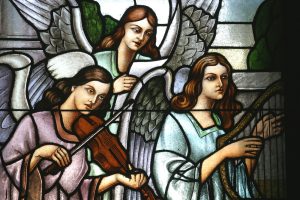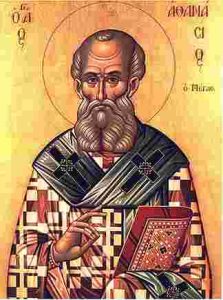It is important to note, that Christianity believes in a metaphysical world where God, angels, spirits, demons and the living interact through the temporal plane and metaphysical plane. How that interaction occurs is what differentiates the occult and extraordinary gifts from God.
As human beings, we are both soul and body. We are hybrids of two worlds and can interact with both worlds. Our material body anchors us in this fallen and temporal world, but our soul although contained within the body is open to metaphysical experiences of the other spiritual realms. It is true only death can allow one to cross over to the metaphysical realm, but our souls are attune to the spiritual realities that can interact with us. As Christians, it is important to tread this line carefully. As spiritual beings, we have spiritual qualities and spiritual aspirations but we must also constrain ourselves and cautiously interact due to evil spirits. Scripture warns in multiple books the dangers of spiritualism, divinization and interaction with spirits.

One might be surprised though that the moment we enter into prayer or meditation, we are already interacting with the spiritual world. In this state, we are talking to God, or asking for intercession before God. We commonly pray for our deceased, or pray for angelic protection as well. These are all examples of safe and secure interactions with the spiritual realm but there are extraordinary cases beyond the everyday function of prayer that is cemented in our faith and shows that God works through individuals and intervenes in history.
Extraordinary Gifts from God
While Christians are constantly warned to avoid spiritualism and divinization and rightfully so, there are numerous cases of the spiritual world communicating with Christians. Christians have spiritual charisms and gifts that are beyond the normal but are highlighted talents within their spiritual makeup that contribute to the spiritual health of the Church. While some individuals may be blessed with extraordinary physical gifts such as strength, speed, or leaping, others possess spiritual gifts that lead to greater insight. These types of gifts should not be shunned, avoided, or dismissed, but embraced.
The key difference is these gifts are directed towards God. They are not intended to prod or intrude upon the unseen world unsafely, but are guided by God’s grace and light. They are receptive to God’s grace and avoid the usage of occult symbols, or pagan tools. They are intended for the greater glory of God and His Church on earth. In Scripture, one can see the variety of charisms bestowed upon the Church. Prophecy, dream communication, speaking in tongues, divine healings, miracles and visions are all extraordinary events but part of the Christian faith. They are given to prophets, healers, mystics and saints to guide the Church. They are not intended for self glorification, gnostic searches for knowledge, or divinization of self, but for God’s greater glory.
Discerning if from God
Obviously discernment is key when dealing with any metaphysical reality. If a Christian displays prophecy, or someone claims visions, then discretion and discernment are required. This is not only critical for the people but the person experiencing the metaphysical activity. Lucifer can indeed appear as an angel of light and it is key that all metaphysical activity is tested. While this may at times seem profane it is also wise. It is critical to dismiss any cases of psychosis or malicious intent from evil spirits. Hence, the message is tested first. Is the message orthodox to the faith? Does it contradict Scripture? Also, what good is coming from the event or the message of the person? Are there any evil consequences? Usually, it is best to leave such messages to proper Church authorities who can deliver a more thorough message.
If miraculous events do indeed occur, a respectful but objective investigative force should look into the person or events. These individuals should possess authority but also be educated within the faith to properly discern and report. Usually, these teams also present scientific members of the community to rule out anything pathological or of a natural explanation.
Within the Catholic Church, the bishop of a diocese sends out investigative teams to undergo a thorough investigation of the event. Like Fatima, Lourdes, or Guadalupe, the Church reviews these metaphysical events and then decides if an apparition, person, or event is spiritually safe for the faithful to visit. In the case of Guadalupe, the miracle of the Juan Diego’s shroud and the image of Mary upon it, convinced the local bishop to approve the apparition.

There are many cases, where apparitions and mystics receive no official declaration, while others are declared not spiritually safe due to unorthodox message or fear of evil spiritual presence. There are charlatans, fakes, and others who play on the faithful, as well as demonic tricks that the Church looks to identify and prohibit. If, however, approved, no message is forced upon for all to believe. The message is declared safe and probable, but the faithful can choose to ignore it. What is in Scripture and the ancient creeds of the faith are the requirements of the faith not later apparitions or spiritual events. Private revelations, even approved ones, are not required for belief.
Still many look to the messages of Fatima or the healing properties of Lourdes as a supplement to the faith because it is does not contradict it but enhances it. Miracles from God still exist today. Visionaries, within their own private revelation, share their stories. Prophets warn of society’s sin. Spiritually attune mystics guide and direct us to God. Ultimately, we are spiritual beings with a spiritual end and whether one likes it or not, we have spiritual connections. The important part is that we safely and with discernment partake in this spiritual journey. Through discernment and following the guidelines of the Church, individuals can become part of the metaphysical world around us without fear of demonic or unsafe pagan practices.
Cultivating Extraordinary Gifts
Christians should never attempt to create within themselves extraordinary gifts. One should not practice spiritualism or attempt to contact the dead. One should never try to awaken within oneself something. One should very much be aware of God’s presence, the presence of evil within our natural spiritual abilities, but beyond this, these extraordinary gifts will manifest within themselves through God.
God chooses who will prophesize, who will interpret dreams, who will speak in tongues, who will heal, or who will experience mystical experiences via apparition or visions. Those who invoke these skills are driven by pride and can fall victim to satanic manipulation. Furthermore, those lacking humility will attempt to create a spectacle to the community. This is why such actions of serpent handling or speaking in tongues for purpose of show boating is not from God. In fact, speaking in tongues, was never babbling but was the miraculous event of the apostles speaking in their own language but being understood by everyone else in their own language for the purpose of proclamation of the Gospel. Hence when cultivating one’s own gifts, or witnessing another’s gift, discern whether this is about the faith or an individual.

Those who experience extraordinary gifts are usually humble. Padre Pio and his stigmata or the three children of Fatima, never sought out these gifts but were chosen by God. God chooses the low and humble to manifest His greatness. Some extraordinary gifts are meant for oneself or a small circle, while other gifts are meant for the faith. Hence it is important when discerning a gift or helping someone discern a gift, if it is sought or given. If its end is prideful or humble.
In addition, all medical and psychological explanations must be explained. If one thinks feels one is seeing the Virgin Mary, one may first question the experience. If counseling one, it may be important to evaluate any signs of psychosis. In many cases, extraordinary events can be tested by asking questions that are beyond the knowledge of the person. This was done in the case of St Bernadette of Lourdes.
After dismissing grandstanding and psychosis, discernment of the source becomes a critical step. Prayer, fasting, collective minds and an orthodox message not contrary to Scripture must be presented. Finally, what good comes from the extraordinary event?
As it stands, many mystics keep silent. Their messages are private or not meant yet for the universal Church. Many are terrified of publicity and scrutiny. This is why many miracles remain in small circles and are meant for those within that circle. Many of us have experienced these small miracles and we know they are meant for the growth of our own faith. We do indeed live in an age of miracles still, if we only look.
We still live in an age of miracles
While the Biblical miracles at this current moment seem distant, we still live in an age of miracles. Personal healings, prophecy, apparitions, and messages from God continue to come to the world. It is merely a matter of looking in the right direction. We must avoid charlatans, fakes, and false prophets. We must understand and discern if the message is from God or Satan. We must dismiss the occult and spiritualism. However, if we use our spiritual sight, we can find where God is appearing and spreading His message through His servants. Miracles are alive today and one day, universal miracles that cannot be doubted will manifest. In the meantime, we must be prepared and discern properly.

Please also review AIHCP’s Christian Counseling Certification and see if it meets your academic and professional goals. The program is online and independent study and open to qualified professionals seeking a four year certification in Christian Counseling.
Additional Resources
“The 9 Gifts of the Holy Spirit”. Bradley, M. (2023). BibleKnowledge.com. Access here
World Apostolate of Fatima. Access here
“Discerning of Spirits: A Crucial Gift for Spiritual Warfare”. Ibbitson, D. Above and Beyond Christian Counseling. Access here
“Christian Mysticism”. The Spiritual Life. Access here



















